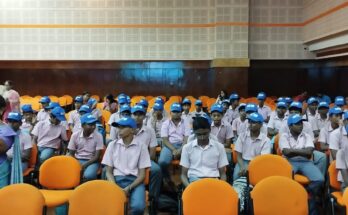Young Indians Feel Ready to Take Lead on Climate Action, Share Recommendations with Leaders – Report
October 2021: British Council, the UK’s international organisation for cultural relations and educational opport unities, in the run up to the COP26 in Glasgow, has published the Global Youth Letter Report. The report states that young people around the world unanimously consider climate change to be the biggest threat facing the pl anet. Based on research and cultural relations work by the British Council, the report highlights a gap in relation to young voices being heard and their ability to influence actionable change.
Young people in Indiabetween 18-25 years of age, were surveyed for the Global Youth Letter Report, through 946 surveys and 80 focus groups.The report found that 78% of the youth in India feel equipped to act against issues arising from climate change like the loss of forest cover, decreased agriculture productivity, dry seasons, rises in temperature, uneven rainfall pattern and loss of biodiversity.However, the research indicates that fin ding opportunities for participationinsolving such issues is also a challenge faced by the youth of the country, because of limited digital access, hierarchical social cultures that exclude young people, and a lack of access to training and skills development. 
Awareness is also a challenge as the report suggeststhat climate change hardly ever features as a part of social conversations with friends, while schools and universities do a considerably better job of discussing climate ch ange issues both in Urban and Rural geogr aphies. 88% of young Indians feel thatgetting knowledge andhel ping others tounderstand climatechange and relatedthreats is pu blicresponsibility and 79% believe that a combin ati on of policy-level changes, education through multiplec ha nnels, including social media, and campaigning thr ou gh activism can be used as a powerfultool to address climate change.
The youth of the country believe that theiropinions on climatewill matter and message to the leaders is that th ey must be included in climate awareness exercises as only 60% have ever been a part of such activities and just6.5% believe they are being heard and acti on is being taken.
Barbara Wickham, OBE, Director, British Council India, said:“The climate emergency is the biggest crisis facing our planet so it’s no surprise that British Council research has found it is the number one priority for young peop le the world over. We are proud and delighted to see the enthusiastic response from young Indians who have put their signatures to our Global Youth Letter so far, calling on world leaders for urgent action.We look forward to engaging more and more young people through our work in India; they are truly the most influential voices to drive change for shared global challenges that we face today.”
Overall, the Global Youth Letter Report surveyed more than 8000 young people from 23 countries – including Brazil, Kenya, and the UK, besides India – about their perspectives on climate change. This research is part of the British Council’s Climate Connection programme, which aims to bring people around the world together to ad dress the challenges of climate change. The findings from the report have been used to write and have been lau nched alongside the Global Youth Letter, a plan of action setting out young people’s aspirations and recommen dations around climate change.
The letter directly addresses the policymakers and world leaders who will attend the UN Climate Change Conf erenceof the Parties (COP26) from 1 to 12 November, in Glasgow, Scotland. Young people are encouraged to sign the letter and pledge to tackle climate change, adding their own recommendations to be considered.
The letter can be signed here: www.britishcouncil.org/climate-connection/get-involved/global-youth-letter




